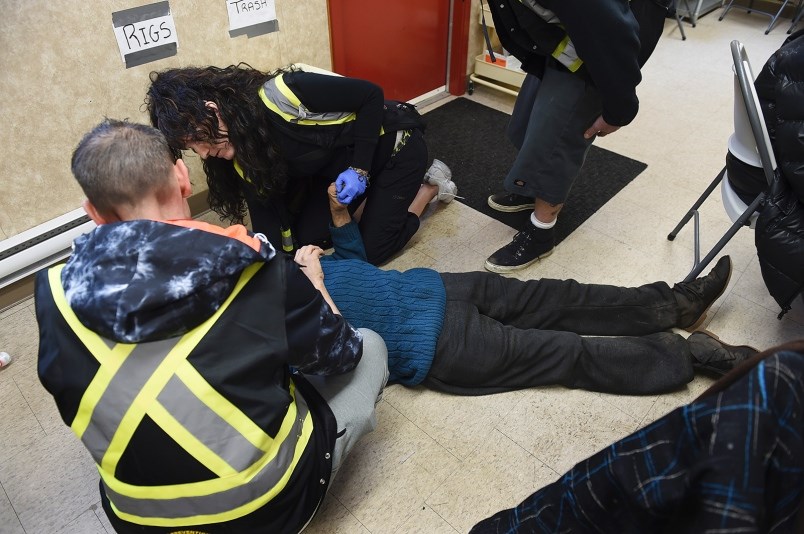A panel of experts is calling for increased access to a safer supply of drugs to reduce the number of illicit drug-related deaths in B.C.
The recommendations are included in a report examining the circumstances of around 6,000 deaths from illicit drug toxicity between Aug. 1 2017 and July 31, 2021.
The report, BC Coroners Service Death Review Panel: A Review of Illicit Drug Toxicity Deaths, reveals that the primary cause of these deaths was the increasingly toxic and unpredictable illicit drug supply in the province and that the current drug policy framework of prohibition is forcing substance users to access the unregulated market, leading to increased numbers of substance-related emergencies and deaths.
Illicit drug toxicity is also the leading cause of unnatural death in B.C., accounting for more deaths than homicides, suicides, motor vehicle incidents, drownings and fire-related deaths combined.
"This report includes realistic, actionable recommendations that the panel believes will reduce the number of people dying due to toxic, illicit drugs in our province," said Michael Egilson, death review panel chair.
"We recognize that many of the timelines in the report are aggressive, but COVID-19 has demonstrated how swiftly policy-makers can act when lives are at stake - and we know that every month of inaction equates to hundreds more lives lost."
The panel's advice to the chief coroner included three recommendations; ensure a safer drug supply to those at risk of dying from the toxic illicit drug supply; develop a 30/60/90-day Illicit Drug Toxicity Action Plan with ongoing monitoring, and establish an evidence-based continuum of care.
The chief coroner has forwarded each of the panel's recommendations to the relevant ministries and organizations.
Findings reviewed by the panel also show:
- deaths are increasing both in number and in rate;
- the drug supply has become increasingly toxic;
- more drug toxicity deaths occur among younger adults - the average age of death is 42;
- illicit drug toxicity deaths are ranked second after cancers for potential years of life lost;
- Indigenous Peoples are disproportionately represented in drug toxicity fatalities;
- individuals living in poverty and with housing instability are more vulnerable;
- people with mental health disorders or poor mental health are disproportionately represented;
- in addition to fentanyl, other substances were also detected in most deaths;
- people had frequently accessed medical services prior to an illicit-drug-related death;
- deaths are occurring throughout the province;
- while the highest number of deaths occur in large urban centres (Vancouver, Surrey, Victoria), this issue spans beyond urban areas; and
- smoking is the most common method of illicit drug consumption
"I want to thank all of the panel members for their expertise and their shared commitment to preventing deaths from the toxic illicit drug supply," said Lisa Lapointe, chief coroner.
"We know that everyone who dies because of drug toxicity leaves behind family, friends and communities who grieve their loss. As we approach the sixth anniversary of the declaration of the public-health emergency into substance-related harms, co-ordinated, urgent action is needed to reduce the devastation illicit drugs have inflicted on so many people in our province. This report, by a panel of subject-matter experts, provides a roadmap. It is my sincere hope that their advice will be actioned."
In a news release, Sheila Malcolmson, Minister of Mental Health and Addictions said the government is working hard every day to end this public health emergency.
"This report confirms the urgency of the work underway by our government. Specifically, it calls on government to build an evidence-based continuum of care to deliver mental-health and substances services, including safer supply. And that is exactly what our government is doing,” said Malcolmson.
"We are making historic investments into mental-health and substance-use services to build a system of care where there wasn't one in 2017. This work is critical and is well underway.”
She said B.C. implemented in 2020, and expanded in 2021, a safer supply program - the first and only province in Canada to do this.
"Since the federal government regulates controlled drugs and substances, we are focused on what we can do within our provincial jurisdiction - a prescribed safer supply model implemented through health authorities.”
The panel also found that the current drug policy of prohibition was contributing to an increase in substance-related emergencies and deaths.
“We agree. We are treating substance use and addiction as a health-care issue, not a criminal one. We are the first and only province to apply to decriminalize people who use drugs. Decriminalization will reduce the fear and shame that keeps people silent and leads so many to hide their drug use and avoid treatment and support.”



